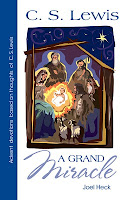Charity - giving to the poor - is an essential part of Christian morality.... I do not believe on can settle how much we ought to give. I am afraid the only safe rule is to give more than we can spare.
~ C.S. Lewis, Mere Christianity, p86
It's interesting to note that in American culture, the more money you earn, the smaller percentage you give to charity. Basically, the working middle class is more generous with their money then the rich. The rich might give more money to charity, but it's a fraction of a percentage of their wealth.
The average American gives about 2% of their wealth away to charity. If you are a regular church-goer, the average goes up to almost 3%, and if you are not a church goer, it drops to under 2%. Then there are those Christians who tithe, who give ten percent of their income (before taxes) to their church and charity. Some Christians increase their tithe by one percent a year.
This means that a struggling working class family of four or five that makes about thirty-thousand a year might give away about a thousand dollars during the year to their church or charity. An ambitious middle class couple making a combined ninety-thousand a year might give a little over a thousand in a year, maybe closer to two. This trend results in the poor being generous to one another, and the well-off being generous to themselves.
Christmastime has traditionally been a time when the wealthy are extra-generous to the poor in their communities. With the festivities and feasts, it was an important time for the rich to give away food and money and gifts to those that earned little for their labor. Christmastime brought the rich and poor together in a special way, especially for Christians.
For God so loved the world that he gave his One and Only Son, that whosoever believes in him shall not perish but have eternal life.
John 3v16
At Christmas time we remember how the great God of the Universe, out of tremendously generous love, became one of us, gave himself to us. God's sacrificial giving to us is a model for how we ought to give sacrificially to those in need around us. Closing our eyes to those in need will not be acceptable to God. Clucking our tongue at our perceived laziness of the poor will not be acceptable to our Lord. We give, not in judgment, but in joy; out of obedience, not observing who is worthy.
It's been said that about two to five percent of Christians tithe. It's been observed that if every Christian in America tithed, we'd have enough money to end global poverty in a year. Every child could have clean water and a good education. Every family in the world could have a roof over their head and enough food in their belly. Charity from Christians could change the world.
Charity is an important part of Christian morality.




























